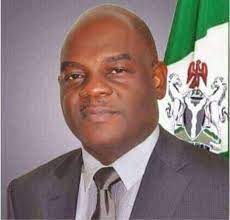By Tersoo Adagher
The Tertiary Education Trust Fund (TETFund) was established by the Federal Government in 2011 to disburse, manage and monitor education tax to government-owned tertiary institutions in Nigeria.
Established as an intervention agency, TETFund was formed as a product of the Education Tax Act of 1993 which, accordingly, repealed the Education Tax Act Cap.
The West African Journal of Open & Flexible Learning, by Sharkdam Wapmuk and Clifford Amini, noted that the scheme was established as a result of poor funding that affected Nigerian public tertiary institutions.
The journal stated that education was pre-requisite for national economy, and that consequently the neglect of the sector had adverse implications for other sectors in the country.
Both authors listed TETFund’s areas of intervention to include; sponsorship of lectures for postgraduate studies, funding constructions and refurbishment of educational facilities, promoting creative and innovative approach to learning.
Others are provision of higher educational books and funding of libraries as well as provision of learning equipment.
They said that based on the data collected and analysed, they realised that the impact of tertiary education trust fund on the development of public tertiary education in Nigeria was noteworthy.
The authors study examined the impact of TETFund in funding public higher education in Lagos state with focus on two tertiary institutions, which were the University of Lagos and Federal College of Education.
However, since the main source of income available to the Fund is the two per cent education tax paid from the assessable profit of companies registered in Nigeria, the Fund is not without agitations from some quarters.
An article by Alex Abutu which appeared in University World News in November 2018 said Dr Abdullahi Baffa, one of the scheme’s past Executive Secretary, had addressed various issues including violation of guidelines.
Baffa was quoted when he consented that scholarships intended to build the capacity of scholars in universities and create opportunities for them to pursue higher education at home and abroad were routinely violated.
He said, “we further realised that in a few institutions they were not giving the scholars the total money that was approved for them.
“They deducted a certain percentage using different sorts of names like administrative charges and all sorts of illegal deductions.’’
Baffa, who was TETFund’s boss from 2016 to 2019, added that oftentimes, people who were given funds to study in Europe or the United States, in some cases ended up going to other African countries.
He also said some scholars given the autorisation to study for their Doctorate degrees sometimes ended up registering for Masters Degree.
The article stated that the former TETFund boss had insisted that the organisation had refocused to implement its mandate.
Notwithstanding this assurance, scholars still argue on the contrary, alleging that the fund was also being used to fortify and strengthen universities abroad.
The same article also mentioned the issue of lack of equipment and expertise identified by University Dons as setbacks to the efficiency of the scheme.
The University World News stated that one Professor Akinbowale James had advised that there should be corresponding facilities to aid teaching and learning when building structures.
James said the Fund should bear in mind that quality research was not just about buildings, but also provision of equipment and expertise which would help to improve the ranking of Nigeria universities.
The Nigerian Extractive Industries Transparency Initiative (NEITI) in Premium Times of October 7, 2019 called on the government to tackle the issue of undue political control in the TETFund scheme.
NEITI alleged that there was unnecessary political control and interference by state governors in the execution of the Education Trust Fund-funded projects in their respective states.
Moreover, some Nigerian academics have urged that the Fund should invest more in higher education in Nigeria instead of enriching universities abroad.
The Fund, since its establishment has witnessed trailblazing leadership by credible appointees who have contributed tremendously in meeting up with the mandates of this intervention agency.
President Muhammadu Buhari in March, appointed Sonny Echono as Executive Secretary(ES) of the Fund after his retirement as Permanent Secretary of the Federal Ministry of Education.
Dr Edet Imuk of the University of Calabar, in an interview with the News Agency of Nigeria (NAN), said the Fund needed reformation and introduction of new policies for optimal performance.
Imuk advised that the new appointee should work towards restoring the confidence of many.
Abdulmumin Oniyangi, Director of Public Affairs in TETFund, in an interview, said Echono was determined to provide quality leadership through transparency and accountability via introduction of innovative policies and reforms aimed at improving efficiency.
Oniyangi said part of the reforms introduced by the new TETFund Boss included; the need for curriculum review, skill acquisition/entrepreneurship, advancement of information and communication technology.
Others are deepening research, development and innovation, provision of funds for capacity building of lecturers in order to equip them with requisite skills for entrepreneurial and research studies in digital technologies.
He further said the reforms would also prepare Nigerian students for global competitiveness with the end goal of building a knowledge economy and increasing the country’s global presence.
“He has initiated a series of partnerships with notable institutions globally and locally, such as University of Brazil, Vicosa on tuition free agreements for training of more Nigerian professionals in agriculture.
“He has also initiated transnational cooperation with the government of Britain, Forum for Agricultural Research in Africa(FARA), Nigerian Economic Summit Group(NESG), African and the Union(AU),’’ Oniyangi said.
The Director of Public Affairs disclosed that the new TETFund Executive Secretary(ES), had signed a Memorandum of Understanding (MoU) with the University of Sussex for the development of tertiary education in Nigeria.
He said Echono had partnered the European Union(EU) on research, development and innovation at Brussels among others, all aimed at articulating new strategies to strengthen government’s efforts in improving the standard of education.
Internally, Oniyangi said the ES had undertaken a holistic review of the operating procedures of the fund, operationalized the zonal offices with delegated functions and set targets.
He said Ochonu had ordered the monitoring and evaluation committee department to complete site visits and process recommendations for tranche releases within two weeks of receipt of requests from institutions.
To minimize human contacts, he said starting with the ICT interventions, the ES also ordered that beneficiary institutions should make submissions electronically.
“Staff of the Fund were requested to make sacrifices by forgoing certain privileges in response to the sharp drop in tax collections in 2021.
“Rather than starting new ones, the ES is also committed to the completion of on-going projects.
“He interacted and secured the buy-in of management and staff of the Fund for the reforms, which have received widespread support of stakeholders,’’ Oniyangi said.
He also noted that perhaps more problematic was the procurement and project management reforms Echonu introduced to eliminate corruption, reduce delivery time of projects and prevent cost escalation.
All these, according to the Director of Public Relations, are to improve general efficiency in the discharge of the Fund’s mandate.
“No more TETFund or vendor promoted projects as the needs of the institutions must prevail,’’ he said.
Oniyangi added that annual disbursement allocations were made directly to the beneficiary institutions at a public ceremony held at the National Universities Commission (NUC) on May 9th.
He said the Vice Chancellors, Provosts and Rectors were directed to advertise and procure their projects through open, competitive bidding to achieve value for money.
“This was widely reported in the media and commended by the Procurement Professionals Association of Nigeria,’’ he said.
By Tersoo Adagher, A Public Affairs Analyst.



